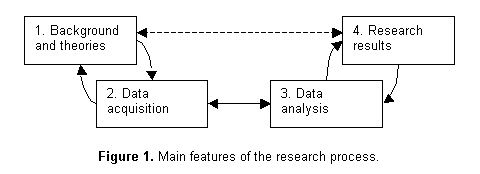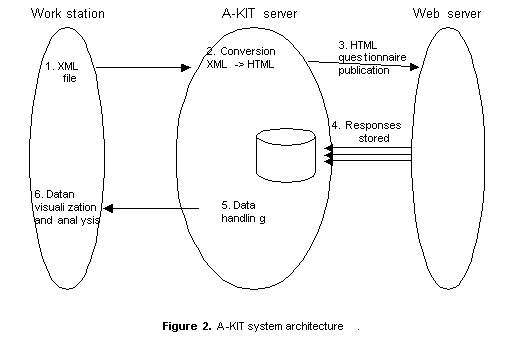
|

|
| Prof. Päivi Häkkinen |
Learning child |
InBCT 2.4. (I)
Agora Learning Laboratory (ALL)
Prof. Päivi Häkkinen,
paivi.hakkinen@ktl.jyu.fi, 014-2603231, 040-5843325
Erikoistutkija, tohtori Marja Kankaanranta
Areas of Interest
E-Learning, virtual learning environments, networked learning, computer supported collaborative learning, digital portfolios, shared expertise, learning at work, tacit knowledge, career development, evaluation methods and criteria for the pedagogical use of ICT, visualization and awareness tools for online communities
MISSION
The Agora Learning Laboratory (ALL) is a multidisciplinary center for research on virtual learning environments and research-based evaluation of these environments, including the use of this knowledge in designing powerful learning environments, pedagogical innovations and evaluation methods for E-Learning purposes. The contexts of the research projects are related to different content areas, educational levels and work organizations. The development of learning environments is particularly related to the tools for studying research methodologies (e.g. interactive data analysis and visualization, experimental designs). The research also aims to develop models of E-Learning in collaboration with the basic research of the university and the practical solutions of companies. This kind of integration of high-level scientific knowledge, pedagogical expertise and know-how on product development enables the rapid transfer of knowledge from research and development projects, thus serving the needs of educational and business organizations.
The laboratory also coordinates know-how in the area of E-Learning at the University of Jyväskylä and is building a collaborative network in this area. The operational collaborative network of the laboratory for educational technology will consist of the central participating actors at the University of Jyväskylä, companies in InBCT and international partners. The survey of collaborative networks acts as the starting point for building the laboratory's scientific framework, mapping the participating actors, planning common projects, and for the general development of operations. The activities of the collaborative network also includes a seminar series.
RESEARCH THEMES
Evaluation and research-based development of learning environments and technological tools
The aim is to produce evaluation criteria to assess and develop the pedagogical impact and applicability of learning environments. A preliminary survey undertaken at ALL suggests that learning environments are evaluated in descriptive terms, and often from the technological viewpoint. For example, the potential of collaborative environments as a catalyst for learning is often overstated. The emphasis of this project is to find ways in which information networks could support human learning and expertise has played a minor role in system development. The laboratory is also engaged in an international assessment of the pedagogically innovative uses of information technology.
Development of Innovative Evaluation Methods
The creation of the evaluation criteria is connected with the development of technology supported innovative evaluation methods as digital portfolios. The purpose is to apply and analyze digital portfolios as an instrument in documentation and evaluation that is supported by information technology for learning, know-how and expert career development. The project combines the use of portfolios, for pedagogical purposes with the design, development and evaluation of network-based environments. These innovative cases are supported in the pedagogical implementation of a digital portfolio.
Creation of the modular model of E-Learning
The aim is to build models, concepts and corresponding prototypes for supporting E-Learning solutions. These solutions are meant to tackle the following research problems: How can the continuously changing knowledge be organized and managed in a way that supports the development of shared expertise (the tacit knowledge problem)? How can the gap between formal training situations and real work situations be reduced? How can knowledge co-ordination and community-building be supported?
Lisätietoja yms.:
More Information etc.:
Häkkinen, P. 2002.
Challenges for design of computer-based learning environments (PDF, 119.6 KB). British Journal of Educational Technology, 33(4), 465-474.
Häkkinen, P., Järvelä, S. & Mäkitalo, K. 2002. Sharing perspectives in virtual interaction:
review of methods of analysis (PDF, 65.8 KB). In B. Wasson, S. Ludvigsen & U. Hoppe (Eds.), Designing for Change in Networked Learning Environments, Proceedings of the International Conference on Computer-Support for Collaborative Learning 2003 (pp. 395-404). Kluwer Academic Publishers: Dortrecht.
Häkkinen, P. (2002). History and Development of Collaborative Learning and E-Learning in Europe: Lessons Learned (PDF, 32.4 KB). Keynote Address at the Asia-Europe Classroom 2nd International Teachers' Conference. Tampere, Finland 11-14 September.
Häkkinen, P.
Challenges for research and development work of digital content (PDF, 23.1 KB).
Häkkinen, P. (2002). Towards individual thinking and emotional learning (PDF, 8.7 KB). Tiedonjyvä Special, 5.
Häkkinen, P. 2002. Internet-based learning environments for project-enhanced science learning (PDF, 11.4 KB).
Journal of Computer-Assisted Learning, 18(2), 232-237.
Häkkinen, P. & Järvelä, S. 2002. Sharing and constructing perspectives in web-based conferencing (PDF, 118.8 KB). To be published in Computers & Education.
Häkkinen, P., Arvaja, M. & Mäkitalo, K. (in press). Prerequisites for
CSCL: Research approaches, methodological challenges and pedagogical development
(PDF, 91.9 KB). In K. Littleton, D. Faulkner, R. & D. Miell (Eds.) Learning to collaborate and collaborating to learn. Nova Science.
Häkkinen, P. (2003). Verkostoperustainen yhteisöllinen oppiminen (PDF, 44.6 KB).
Jyväskylän yliopisto. Tieto- ja viestintätekniikan opetuskäytön
tutkimusseminaari. Kurssimateriaali.
ICT in Learning and Working Environments, Tietoverkot oppimis-
ja työympäristöissä (TOP) (PDF, 72.3 KB).

|

|
| Researchers Olli Hokkanen & Timo Aittokoski |
Researcher Timo Aittokoski |
InBCT 2.4. (II)
A-KIT = Agora Exploratory Environment for Knowledge Discovery
Prof. Tommi Kärkkäinen,
tka@mit.jyu.fi, 014-2602772
Tutkija Timo Aittokoski
Agora Center's common research infrastructure is being developed in connection with this Agora Learning Laboratory (ALL) part project. The goal of the A-KIT project is to design and implement a software application that gives integrated support for questionnaire studies especially, and also supports acquisition of data, visualization and interactive, qualitative/quantitative analysis.
A-Kit System: The Basic Structure
The overall process dealing with the management of the research problem is described with the following stages in the A-KIT system.
The information technology solution supporting the management of the research problem encompasses the stages 2 and 3. In addition, the theory background of the stage 1 can be linked to a questionnaire designed on the basis of the solution.


- The questionnaire is produced as an XML document.
- The XML document is automatically converted (DTD + XSL) to an HTML page.
- The HTML page is published in the server.
- The target population responds to the questionnaire. Their replies are directed and automatically stored in an A-KIT server.
- Replies obtained are formatted (dimension compression, format change), in the A-KIT server, as required by the visualization tool.
- The inspection and analysis of the replies with the visualization tool takes place in the user's work station.
InBCT 2.4
Agora Learning Laboratory (ALL)
Agora Learning -laboratoriosta on tarkoitus muodostaa kansainvälisesti tasokas tutkimus- ja kehittämisyksikkö sekä tutkijankoulutusympäristö, jonka toiminta perustuu Jyväskylän yliopiston monitieteiseen osaamiseen. Laboratorion tavoitteena on edistää virtuaalisten oppimisympäristöjen tutkimusta sekä tutkimuslähtöistä arviointia ja kehittämistä eri koulutusasteiden, organisaatioiden ja sisältöalueiden näkökulmat huomioon ottaen. Oppimisympäristöjen kehittäminen liittyy erityisesti tieto- ja viestintäteknologiaa hyödyntäviin metodiopetuksen opiskeluympäristöihin (esim. tiedon visualisointiin ja kokeelliseen tutkimukseen). Tavoitteena on kehittää hyvää E-Oppimisen mallia yhteistyössä yliopiston perustutkimuksen ja yritysten
soveltavien ratkaisujen kesken. Lisäksi laboratorion tehtävänä on koordinoida
Jyväskylän yliopiston osaamista E-Oppimisen alueella. Tutkimustietoa tullaan soveltamaan mm. verkko-oppimisen mallien, pedagogisten innovaatioiden ja oppimisympäristöjen arviointimenetelmien kehittämisessä. Korkeatasoisen tutkimustiedon, pedagogisen asiantuntemuksen ja tuotekehitysprosessien tuntemuksen yhdistäminen mahdollistaa nopean tutkimus- ja kehittämistoiminnasta saadun tiedon siirtämisen laajemmin opetustoimen alueelle sekä työelämän
tarpeisiin.
Lisätietoja yms.:
More Information etc.:
Tommi Kärkkäinen, Timo Aittokoski & Olli Hokkanen.
A-KIT Working Report and Functional Development
(PDF, 195.7 KB)
Abstract: The A-KIT visualization system is used to process questionnaire data with
specific mathematical algorithms and to analyze the results in a three-dimensional view.
This makes it possible to detect the most defining factors of the data set, e.g. separate data
points or groups, more efficiently than with ordinary methods. The A-KIT system also
supports comparisons between question correlations and relations between individual data
points.
Leena Hiltunen & Tommi Kärkkäinen,
Topic-case Driven Approach For Web-course Design
(PDF, 1.4 MB)
Abstract: A topic-case driven methodology for web-course design and realization process
is introduced. The proposed approach is based on software engineering metaphors for
capturing the necessary steps for creating web-courses using a content-based development
method. Also, pedagogical and technical activities as well as unitwise and overall
assessment are considered. Finally, possibilities for constructing and maintaining webcourse
repository and corresponding training programs are discussed.
Tommi Kärkkäinen, MLP in Layer-Wise Form with
Applications to Weight Decay (PDF, 7.6 MB), Neural Computation, vol. 14, nr. 6, 2002.
Tommi Kärkkäinen and Erkki Heikkola,
Robust Formulations for Training Multilayer Perceptrons
(PDF, 511.4 KB), to appear in Neural Computation.
Tommi Kärkkäinen, Olli Hokkanen & Timo Aittokoski, Agora Exploratory Environment for Knowledge Discovery (A-KIT) + Digitaalisen materiaalin sisällöntuotantoprosessin kehittäminen (Vuoden 2003 tavoitteet
ja tulokset) (PPT, 193.5 KB)
| 
